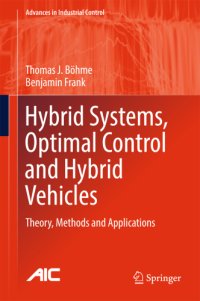
Ebook: Hybrid systems, optimal control and hybrid vehicles: theory, methods and applications
Author: Böhme Thomas J., Frank Benjamin
- Tags: Automatic control engineering, Automotive technology & trades, Control theory, Hybrid electric vehicles, TECHNOLOGY & ENGINEERING--Engineering (General), Electronic books, Electronic book, TECHNOLOGY & ENGINEERING -- Engineering (General)
- Series: Advances in industrial control
- Year: 2017
- Publisher: Springer International Publishing
- City: Cham;Switzerland
- Language: English
- epub
This book assembles new methods showing the automotive engineer for the first time how hybrid vehicle configurations can be modeled as systems with discrete and continuous controls. These hybrid systems describe naturally and compactly the networks of embedded systems which use elements such as integrators, hysteresis, state-machines and logical rules to describe the evolution of continuous and discrete dynamics and arise inevitably when modeling hybrid electric vehicles. They can throw light on systems which may otherwise be too complex or recondite. Hybrid Systems, Optimal Control and Hybrid Vehicles shows the reader how to formulate and solve control problems which satisfy multiple objectives which may be arbitrary and complex with contradictory influences on fuel consumption, emissions and drivability. The text introduces industrial engineers, postgraduates and researchers to the theory of hybrid optimal control problems. A series of novel algorithmic developments provides tools for solving engineering problems of growing complexity in the field of hybrid vehicles. Important topics of real relevance rarely found in text books and research publications?switching costs, sensitivity of discrete decisions and there impact on fuel savings, etc.?are discussed and supported with practical applications. These demonstrate the contribution of optimal hybrid control in predictive energy management, advanced powertrain calibration, and the optimization of vehicle configuration with respect to fuel economy, lowest emissions and smoothest drivability. Numerical issues such as computing resources, simplifications and stability are treated to enable readers to assess such complex systems. To help industrial engineers and managers with project decision-making, solutions for many important problems in hybrid vehicle control are provided in terms of requirements, benefits and risks. Advances in Industrial Control aims to report and encourage the transfer of technology in control engineering. The rapid development of control technology has an impact on all areas of the control discipline. The series offers an opportunity for researchers to present an extended exposition of new work in all aspects of industrial control.;Series Editors' Foreword; Preface; Intended Readership; What are the Contributions of This Book; What is Not Covered in This Book; Structure of the Book; Acknowledgements; Contents; Abbreviations and Symbols; 1 Introduction; 1.1 Motivation, Challenges, and Objectives; 1.2 Vehicle Design Aspects; 1.2.1 Stages of Energy Conversion; 1.2.2 Real-World Driving Profile, Consumption, and Emissions; 1.3 Process Model, Control Strategy, and Optimization; 1.3.1 General Problem Statement; 1.3.2 Energy Management; 1.3.3 Numerical Solutions; 1.4 Bibliographical Notes; References.
Download the book Hybrid systems, optimal control and hybrid vehicles: theory, methods and applications for free or read online
Continue reading on any device:

Last viewed books
Related books
{related-news}
Comments (0)